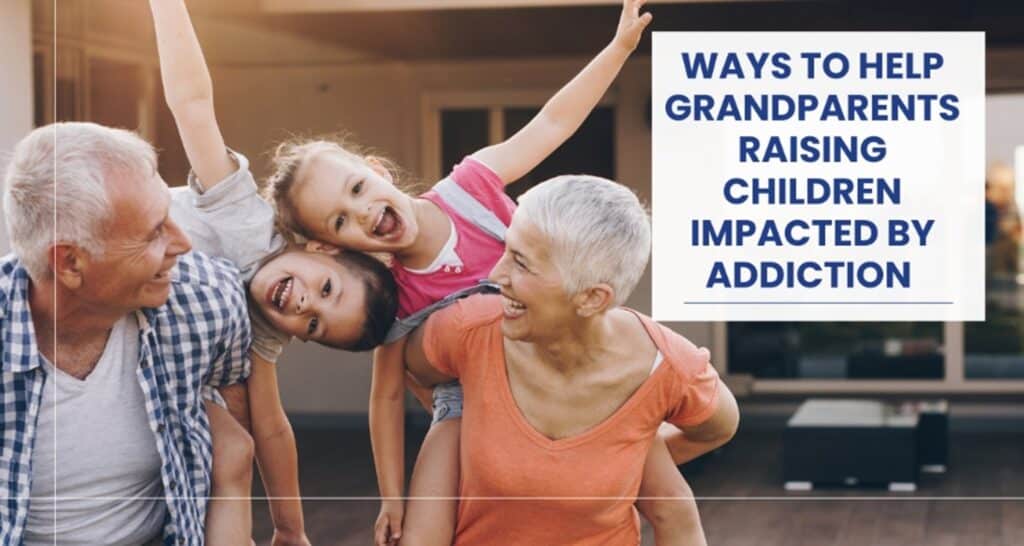As of 2022, over 2.6 million children in the US are raised by grandparents or other relatives. A significant number results from one parent struggling with addiction. As feature on the 60 Minutes article Opioid Epidemic Leaving Grandparents to Raise Grandchildren, there were more than one million grandchildren being raised by grandparents primarily due to the opioid epidemic in this country. “there were more than one million grandchildren being raised by grandparents primarily due to the opioid epidemic in this country.” According to Grand Resource: Help for Grandfamilies Impacted by Opioids and Other Substance Use, a report generated by Generations United, the number of children in the child welfare system doesn’t reflect the total number of grandfamilies impacted: “more relatives are raising children because the parents have died, are incarcerated, are using drugs, are in treatment or are otherwise unable to take care of their children. The vast majority of children being raised by relatives live outside the formal foster care system. Yet the child welfare system relies heavily on relatives, so much so that about a third of all children in foster care are living with relatives.”
More and more grandparents are thrust into saving and raising their children’s children, they’re often filled with the fear of not being physically, financially, or emotionally strong enough to once again raise children. Unlike foster parents, these grandparents are not provided with financial support or services tailored to help them and the children.
Holiday times are particularly poignant for them as they worry about and grieve for their own children while they try to protect their grandchildren through the sadness and fear the impending holidays will bring.
In communities in which these restructuring families, headed by grandparents struggling to survive, to create supportive, nurturing environments that help the children to feel supported, and to be proud, opportunities abound for neighbors, their faith congregation, their close and distant family members to offer the love and admiration they richly deserve — and need to feel whole.
If you live in a community in which many grandparents are raising their grandchildren — whether the result of the impact of the disease of addiction or for other reasons — here are some ways you can help:
- Urge grandparents to empower themselves to learn about the disease of addiction and its related trauma so that they might have a better understanding of what their child is/was going through (and what impact it might have on the next generation). NACoA’s Kit for Parents and Caregivers provides a great overview.
- Encourage the grandparents to attend a support group, such as Al-Anon, to process the difficult emotions they might be feeling about their child’s addiction. These parents deserve their own healing, and it helps provide healthy modeling as they care for their grandchildren.
- Include these grandparents when arranging get togethers for kids to play. Remind them they belong, and that these children are surrounded by a community that cares.
- Share online resources that might be useful to someone once again raising children. They may need some assistance in feeling comfortable with today’s technology. A plethora of guidance resources are now available online or through apps: parenting, working with schools, and how to raise healthy children vulnerable to devices, substance use, gambling. NACoA’s blogs cover a variety of topics that can provide some additional assistance.
- Offer to go grocery shopping, make a meal, or run an errand for the grandparents, giving them additional time to spend with their grandchildren, or the ability to visit adult children who may also need their support.
- Donate toys, clothing, and other child-related items to those in need or local shelters, who may be helping grandparents who cannot afford the financial burden of child-raising
- Babysit local grandchildren the grandparents can have a break or offer your babysitting services to a local Al-Anon meeting so grandparents can attend. When meetings are held at faith communities, this could be a meaningful service provided by the family ministry.
- Ask a local church or community center to host a weekly support group for grandparents raising grandchildren or caregiver’s respite event. Childrensministry.com provides some helpful guidance: What “Grandfamilies” Need From Your Church.
- Reach out to the educators, guidance counselors, or school psychologists at your local schools to see if there is any way you can volunteer or help the children in some way in order to make their transition to a new home and neighborhood go more smoothly. NACoA’s Tools for Educators Supporting Children Impacted by Parental Substance Use provides a set of resources designed to deepen understanding, support emotional safety, and empower the school campus to be available to children impacted by addiction and the adults who care for them.
- Advocate — or support those who advocate — for your state’s foster care system to provide these grandparents the same support foster care parents receive.
It takes a village to bring hope and help to these children. Breaking the intergenerational chain of addiction and its related trauma depends a great deal on the environments in which they are raised. Communities need to reach out to grandparents on the front lines of childcare and offer support, encouragement, and pathways to healing. Creating supportive, nurturing environments to help kids and teens feel supported and safe is essential for their healing and developing healthier lives.
